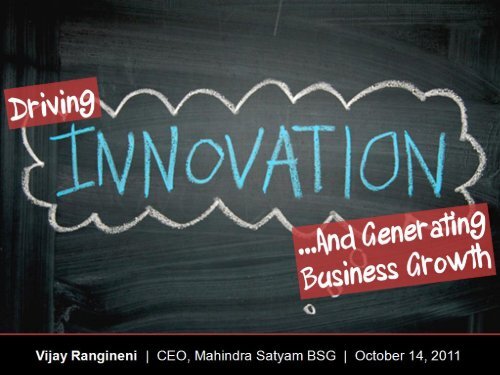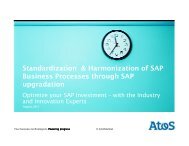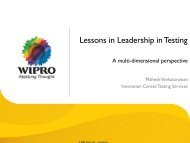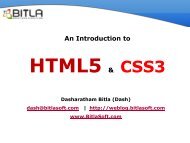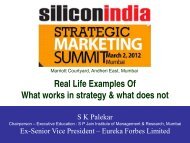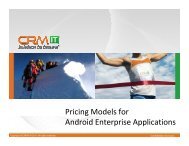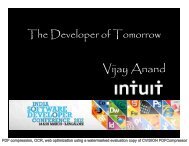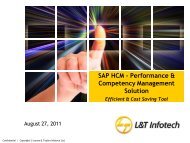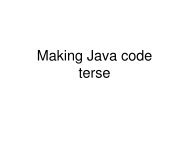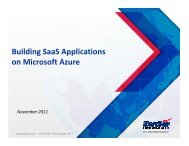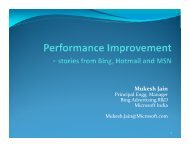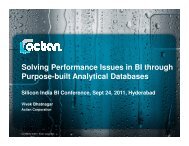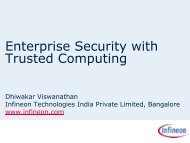Mahindra Satyam Powerpoint Template
Mahindra Satyam Powerpoint Template
Mahindra Satyam Powerpoint Template
You also want an ePaper? Increase the reach of your titles
YUMPU automatically turns print PDFs into web optimized ePapers that Google loves.
© <strong>Mahindra</strong> <strong>Satyam</strong> 2009
The CIO is dead…long live the CIO!<br />
Commoditization<br />
• Network Technology<br />
• Storage Technology<br />
• PC Technology<br />
• Web Technology<br />
© <strong>Mahindra</strong> <strong>Satyam</strong> 2011<br />
Consolidation<br />
• Enterprise Resource<br />
Planning<br />
• Database Management<br />
• Business Intelligence<br />
• Growth of Application<br />
Suites vis-à-vis pointsolutions<br />
Outsourcing<br />
• Increased best practices;<br />
lower need for constant<br />
monitoring<br />
• Shift towards multisourcing,<br />
resulting in<br />
greater specialization and<br />
increased satisfaction<br />
levels<br />
• Increased competition<br />
among service providers<br />
leading to greater choice<br />
Cloud Computing<br />
• Emerging combination of<br />
cheap internet-based<br />
telecommunications, high-<br />
capacity data centers &<br />
standardized browser<br />
technologies<br />
• Growth of consultant /<br />
on-demand model for<br />
standard functions –<br />
human resources,<br />
infrastructure, etc.<br />
„Generic IT‟ (i.e., IT in the sense of managing technology infrastructure) is on the<br />
cusp of becoming a critical but non-strategic asset<br />
2
CEO-speak: The changing role of IT<br />
Significant change in perception of – and expectations from – IT, in coming years<br />
Source: “The Digital Company 2013: The Freedom to Collaborate”, Economist Intelligence Unit, 2008<br />
Respondents: 661 C-level executives and board members from 20 different industries across the world<br />
© <strong>Mahindra</strong> <strong>Satyam</strong> 2011<br />
27%<br />
It will be a full partner in our business, helping us to meet<br />
strategic objectives in most areas of operation<br />
57%<br />
41%<br />
34%<br />
Along with technical support, it is influential in helping us<br />
to improve operating efficiency and reduce costs<br />
32%<br />
9%<br />
It will mainly be a technical support function,<br />
to keep our systems up and running<br />
3
CEO-speak: Key developments that will impact business (2008-13)<br />
Change in business models due to technology innovation<br />
Source: “The Digital Company 2013: The Freedom to Collaborate”, Economist Intelligence Unit, 2008<br />
Respondents: 661 C-level executives and board members from 20 different industries across the world<br />
© <strong>Mahindra</strong> <strong>Satyam</strong> 2011<br />
Greater political and macroeconomic uncertainty<br />
Changing nature of demand for your products/services<br />
Greater difficulty in acquiring and retaining employees<br />
Increasing competition from lower-cost rivals<br />
Greater complexity of regulatory & compliance requirements<br />
Rising wealth levels in emerging markets<br />
Higher cost of energy resources<br />
Rising security threats<br />
Increasing CSR requirements<br />
Others<br />
The CIO can emerge as a key asset to the CEO by employing a strategic approach<br />
2<br />
3<br />
5<br />
13<br />
15<br />
19<br />
21<br />
22<br />
28<br />
29<br />
31<br />
4
The new CIO: Time for a paradigm shift<br />
• From alignment to convergence: Get involved in the business, collaborate with<br />
the front line, and devise technology-based solutions for business development<br />
• From technology supplier to services orchestrator: Integrate legacy and new<br />
technologies to boost utility and create value for the business<br />
• From operations to business outcomes: Contribute directly to initiatives<br />
related to revenue growth, customer intimacy and other business priorities<br />
• From rules to ‘guardrails’: Create user-friendly governance policies, educate<br />
users and draft new rules for ownership, accountability and responsibility<br />
• From execution to innovation: Partner with innovators within the system and<br />
create platforms for rapid innovation<br />
© <strong>Mahindra</strong> <strong>Satyam</strong> 2011<br />
5
Internal Focused<br />
Perspective: Four personas of the next-gen CIO<br />
© <strong>Mahindra</strong> <strong>Satyam</strong> 2011<br />
Infrastructure<br />
(Cut costs, manage legacy systems)<br />
Intelligence<br />
(Improve business user access<br />
to relevant information)<br />
Technology Savvy<br />
4 ‘I’s<br />
in ‘CIO’<br />
Business Savvy<br />
Integration<br />
(Bring together processes, data, systems,<br />
legacy systems & cloud-based approaches)<br />
Innovation<br />
(Have good understanding of business,<br />
be up-to-date with disruptive technology,<br />
and enable innovation at low cost)<br />
Source: “Best Practices: The Four Personas of the Next Generation CIO”, Constellation Research, 2011<br />
External Focused<br />
6
The future-state CIO: Leadership competencies journey<br />
Source: “The Future-State CIO”, CIO Executive Council & Egon Zehnder Intl., 2010<br />
Respondents: More than 25,000 senior executives, including CEOs, CFOs, COOs and CIOs<br />
© <strong>Mahindra</strong> <strong>Satyam</strong> 2011<br />
7
IT support along the innovation life cycle<br />
The height of the bar suggests the amount of resources needed at any stage<br />
Source: “Technology Forecast 2011”, PwC, 2011<br />
© <strong>Mahindra</strong> <strong>Satyam</strong> 2011<br />
IT-enabling the end-to-end<br />
innovation process:<br />
• Common nomenclatures:<br />
Simplifying terminology<br />
for infrequent users<br />
• Digital interfaces: Enabling<br />
seamless selection, design,<br />
prototyping, alpha and beta<br />
testing, and other stages in<br />
the flow<br />
• New process introduction:<br />
Employing new tech to<br />
enable more and better<br />
innovations<br />
• Monitoring & improvement:<br />
Measurement and analytics<br />
at different stages of the<br />
innovation life cycle<br />
8
CIO-speak: Ranking of key business strategies<br />
© <strong>Mahindra</strong> <strong>Satyam</strong> 2011<br />
Business strategies Ranking<br />
2008 2009 2010 2011 2014<br />
Increasing enterprise growth * * * 1 1<br />
Attracting and retaining new customers 2 4 5 2 3<br />
Reducing enterprise costs 5 2 2 3 6<br />
Creating new products or services (innovation) 3 8 6 4 4<br />
Improving business processes 1 1 1 5 13<br />
Implementing and updating business applications * * * 6 12<br />
Improving the technical infrastructure * * * 7 7<br />
Improving enterprise efficiency * * * 8 10<br />
Improving operations * * * 9 2<br />
Improving business continuity, risk and security * * * 10 23<br />
Expanding into new markets and geographies 4 10 13 11 5<br />
Attracting and retaining the workforce 6 3 4 12 8<br />
Introducing and improving business channels * * 15 15 9<br />
* New response category<br />
Source: “Reimagining IT: The 2011 CIO Agenda”, Gartner, 2011<br />
Respondents: 2,014 CIOs across 38 industries and 50 countries, representing over $160 bn. in IT budgets<br />
9
CIO-speak: Key sources of success and influence<br />
Business results<br />
Business knowledge<br />
C-level relationships<br />
Business relationships<br />
IT knowledge<br />
IT relationships<br />
Authority as CIO<br />
Vendor relationships<br />
© <strong>Mahindra</strong> <strong>Satyam</strong> 2011<br />
1<br />
2<br />
3<br />
6<br />
8<br />
14<br />
Traditional sources of success and influence are diminishing<br />
in importance, signaling a shift in CIO focus towards<br />
business strategy formulation and growth-focused initiatives<br />
Source: “Reimagining IT: The 2011 CIO Agenda”, Gartner, 2011<br />
Respondents: 2,014 CIOs across 38 industries and 50 countries, representing over $160 bn. in IT budgets<br />
29<br />
37<br />
10
Perspective: Six types of money-making CIOs<br />
• The entrepreneurial CIO: Responsible for generating sales including external<br />
sales as well as traditional IT planning, design, implementation and operations<br />
• The cost-optimisation CIO: Helping businesses to meet earnings targets<br />
through IT procurement and decommissioning methods<br />
• The revenue-creating CIO: Exploiting IT technologies, products and services to<br />
help increase enterprise revenue<br />
• The business innovation CIO: Placing IT staff members within product<br />
development areas of the business<br />
• The business development CIO: Transferring IT operational responsibilities to<br />
a senior enterprise executive and reporting directly to a head of business<br />
development, the CIO will still retain IT-business planning responsibilities<br />
• The public-serving CIO: Public-sector CIOs will leverage technology to make<br />
services accessible to a larger population, improve comfort levels of the public<br />
with government services/products and help boost revenues (e.g., e-Seva)<br />
Source: “Top Predictions for 2011: IT’s Growing Transparency and Consumerization”, Gartner, 2011<br />
© <strong>Mahindra</strong> <strong>Satyam</strong> 2011<br />
11
Examples: Money-making CIOs<br />
© <strong>Mahindra</strong> <strong>Satyam</strong> 2011<br />
• Betfair had over £1bn worth of bets placed via mobile<br />
products developed in-house in 2011<br />
• Tesco used its own mobile development team in 2010 (as<br />
an extension to its IT team) to launch a free mobile app<br />
for Google's Android OS to provide shopping and delivery<br />
services. Tesco's store and product-finding iPhone app,<br />
Tesco Finder, reached one million downloads in 2010<br />
• London minicab firm Addison Lee is set to take £20m in<br />
bookings through its iPhone app in 2011, adding ~25%<br />
to the turnover, from an app launched just 6 months ago<br />
• Online retailer Net-a-Porter plans to double its IT team<br />
to support increased in-house product development<br />
across e-commerce and mobile platforms<br />
12
Summary: The new CIO success cycle<br />
Source: “Reimagining IT: The 2011 CIO Agenda”, Gartner, 2011<br />
Respondents: 2,014 CIOs across 38 industries and 50 countries, representing over $160 bn. in IT budgets<br />
© <strong>Mahindra</strong> <strong>Satyam</strong> 2011<br />
13
© <strong>Mahindra</strong> <strong>Satyam</strong> 2011<br />
Thank you<br />
mahindrasatyam.com<br />
Safe Harbor<br />
This document contains forward-looking statements within the meaning of section 27A of Securities Act of 1933, as amended, and<br />
section 21E of the Securities Exchange Act of 1934, as amended. The forward-looking statements contained herein are subject to<br />
certain risks and uncertainties that could cause actual results to differ materially from those reflected in the forward-looking<br />
statements. <strong>Satyam</strong> undertakes no duty to update any forward-looking statements. For a discussion of the risks associated with our<br />
business, please see the discussions under the heading “Risk Factors” in our report on Form 6-K concerning the quarter ended<br />
September 30, 2008, furnished to the Securities and Exchange Commission on 07 November, 2008, and the other reports filed with<br />
the Securities and Exchange Commission from time to time. These filings are available at http://www.sec.gov<br />
14


